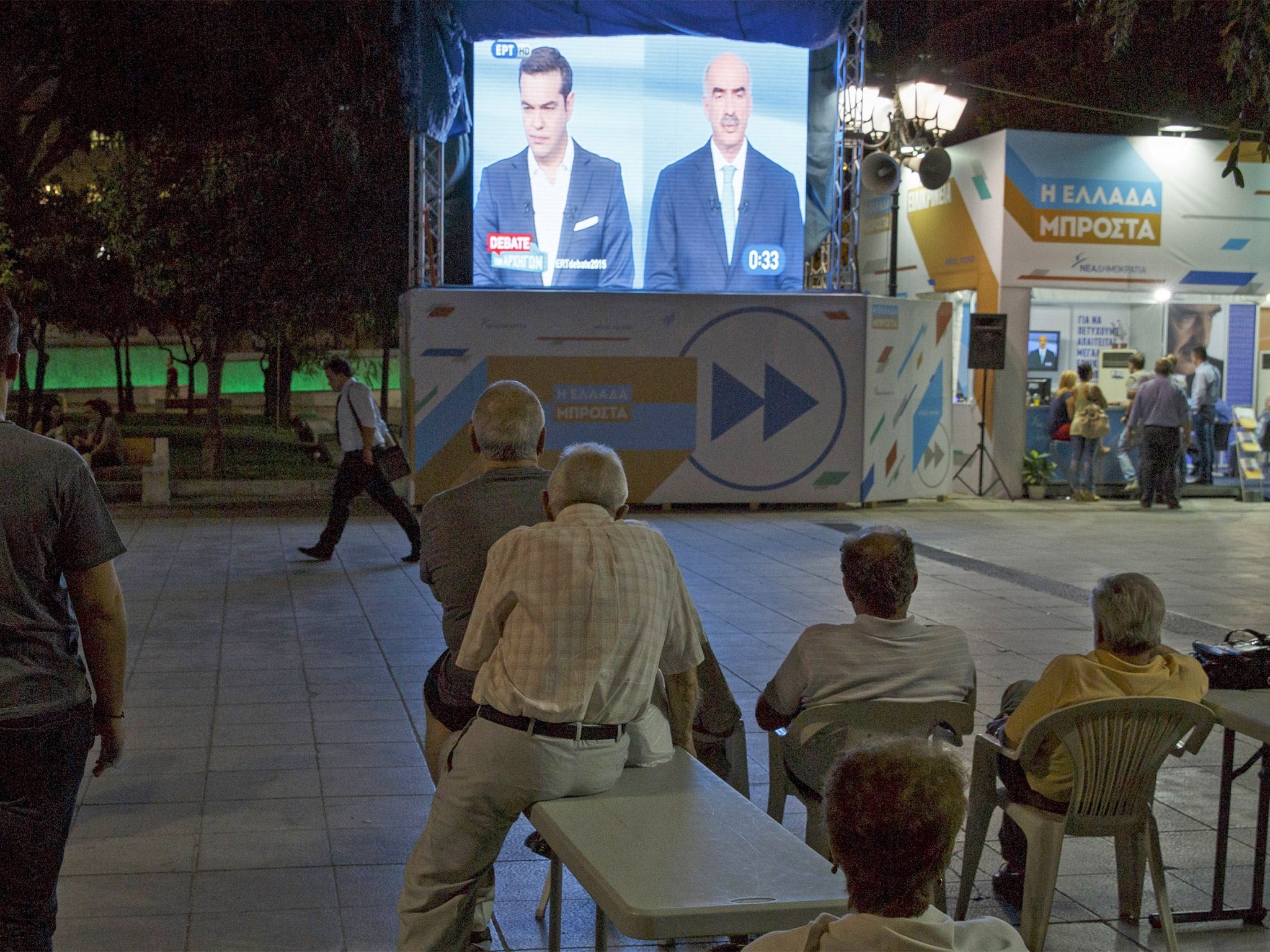Greece election: Party leaders trade blows as nation prepares to go to the polls for third time in a year
Left and Right 'neck and neck' days before election as voters lose patience with political class

The final leaders’ televised debate in Athens started cordially enough. But it didn’t last. “I don’t envisage you as prime minister nor deputy prime minister, nor would I ever want you to be prime minister again,” veteran right-winger Vangelis Meimarakis spat at his rival, Alexis Tsipras, the leader of the hard-left Syriza party whose resignation triggered Greece’s third poll, including a referendum, in a year. “You are on your way out (and you) brought catastrophe.”
He may be be right. Last month, Greeks voted overwhelmingly in a referendum to reject the harsh terms of Europe’s third multi-billion Euro bailout. Yet subsequently, Mr Tsipras performed what one commentator called a “stupefying somersault”, caving in to conditions worse than those he could have negotiated months before. Now he is once again asking Greeks to trust him.
A torpor has settled on the electorate before Sunday’s poll. “I don’t vote for any of them, they are all liars,” growled an elderly man seated in in central Athens’ Omonia Square, as deserters from Tsipras’s party set up the sound system for a rally of their new party, Popular Unity. “I have nothing else to say.”
On a tray by his side was his meagre wherewithal – a small collection of watches given to him for repair.
In the debate Mr Tsipras, spurned the idea of a grand coalition with Mr Meimarakis’s New Democracy, a party that for many of his supporters represents the corruption that got Greece into its mess. ‘We have fundamental differences, and as such we can’t co-exist…The country will have a government and I will respect the result. But there will not be an unnatural government. Either the country will have a progressive government or a conservative one. We need a natural team, not only in the governing of the country but also in its direction.’
With a coalition thus ruled out, the result is anyone’s guess: a poll published hours before the debate put both parties on 31.6 per cent, short of the 36 per cent that took Mr Tsipras into office in January.
Many of Tsipras’s former supporters are still unsure of him. Xenophon, an Athens businessman in his sixties, says he is ready to give him another chance. ‘‘He is an honest man. Because he was inexperienced, he didn’t understand the power of money. But I think he will fight corruption, and corruption is our big problem.’’
His anti-corruption drive so far has not impressed. The man Mr Tsipras appointed to tackle the problem admitted little had been done. Tryfon Alexiadis, Secretary General of Public Revenue, said he has neither the tools nor the people to go after major tax evaders. Of more than 2,000 Greeks listed as holding secret accounts with HSBC in Geneva, so far fewer than 150 have been investigated.
Others argue that his few, tempestuous months at the top have not given Mr Tsipras sufficient time. Konstantinos Tasoulis, Assistant Professor at the American College of Greece, said: “Tsipras has not been in power long enough. It will require time to see whether some of the promises he made will be followed up.” Meanwhile, it emerged that dozens of schools have failed to open because there is shortfall of 21,000 teachers, the result of Education ministry cuts.
In Professor Tasoulis’s analysis, huge levels of tax evasion in Greece derive from a lack of trust in the state that goes back millennia. ‘‘This is a systemic problem, which will have to be addressed by the nation as a whole. It is true that millions are suffering (from austerity measures), from pensioners to entrepreneurs to the poorest in society. Despite that, people would be willing to contribute, if there was a sense of justice, if people had light at the end of the tunnel.’’
Can Mr Tsipras provide restore the missing trust? ‘‘For some people, who had greater expectations of Tsipras, there is a sense of betrayal. But many had a low evaluation of the options. It’s true that there is no excitement about the election. Whichever government is in power, it will need to implement the bailout agreement Greece has signed. So we are not talking about different policies but integrity and competence. People feel no passion about this election. Instead, there is a sense of helplessness.’’
Subscribe to Independent Premium to bookmark this article
Want to bookmark your favourite articles and stories to read or reference later? Start your Independent Premium subscription today.

Join our commenting forum
Join thought-provoking conversations, follow other Independent readers and see their replies